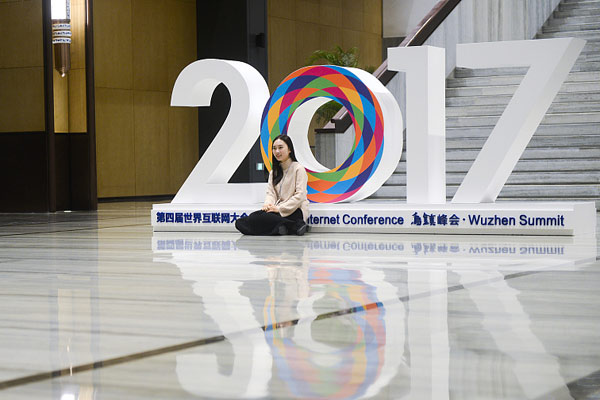China takes lead in mobile internet and AI
CEOs of three online firms peep into a future where artificial intelligence will likely reign supreme
Editor's Note: The fourth World Internet Conference, also known as the Wuzhen Summit, opens on Sunday in Wuzhen, Zhejiang province, and will close on Tuesday.
In the run-up to the event, China Daily reporters Ouyang Shijia, Fan Feifei and Jing Shuiyu interacted with top executives from three up-and-coming online businesses and sought their views on the raging topics in the world of the internet.
Wang Jing, founder and CEO of JingChi Corp, a Chinese autonomous driving developer, Xiao Hong, CEO of Perfect World Co Ltd, "China's earliest online game company with overseas operations", and Wang Xiaochuan, CEO of Sogou Inc, an online search engine and browser, discussed how the internet is reshaping innovation and how it will likely influence larger economic forces in the years to come. Excerpts:
How do you view China's role in the global internet arena? In your view, what are the most innovative trends or products in China?
Wang Jing: China is a key player in this mobile internet trend, and it is very likely that China will seize the leadership in the next few years.
China has been proven successful and innovative in various sectors - online payments, the O2O (online-to-offline) segment and social networking.
In the next era of artificial intelligence, China will be a great power although it is still in its infancy. It already shows big advantages in computer vision, voice recognition and autonomous driving. On the research side, China also has the highest number of cited papers concerning "deep learning" or "deep neural network".
Xiao Hong: Over the past 23 years, the number of China's netizens has grown greatly and huge achievements have been made in network infrastructure, making China the true network power.
Starting from scratch and developing from weak to strong, network informatization in China has achieved a lot.
China has been advancing in network construction, allowing the achievements of internet development to benefit the 1.3 billion Chinese and people from other countries.
On Nov 16 last year, the Chinese government stressed in the third World Internet Conference that the country should ensure the common well-being of humanity, uphold cyber sovereignty, promote more fair and equitable global internet governance and bring about an open, inclusive and secure cyberspace that underlines equality, mutual respect, innovation and orderly development.
Well-being of humanity is a goal that fully reposes confidence and responsibility in China in internet global governance.
The most innovative part is that we have both a systematic theory and a firm practice of that. Our goal is to allow the achievement of internet development to benefit all the Chinese.
We clearly realize that cybersecurity and informatization are bound together. We are implementing three plans - the internet power strategy, the "Internet Plus" action plan and the national big data strategy.
Our goals are populating the network infrastructure, enhancing innovative ability, developing the information economy and improving cybersecurity.
We insist on the principle of respecting cyber-sovereignty, maintaining peace and security, promoting cooperation and building order.
Wang Xiaochuan: Chinese internet companies are taking a leading position around the world, not only in providing technologies to support their users but in offering novel business models.
The internet sectors of China and the United States are well-matched in strength. There are four Chinese internet companies and six American internet companies in the top 10 list worldwide.
At present, the most innovative trend in China is sharing economy, which is beyond our inherent thinking pattern.
From your perspective, what are the characteristics of a powerful internet-driven country? What do you think are the advantages and challenges that China faces in becoming a powerful internet-friendly economy?
Wang Jing: Equality in information acquisition ensures fairness in market competition. China has an incentive and is making a great leap forward to becoming the most powerful internet player in nearly every aspect, thanks to increased technology development and a great population. A fairer market can help guarantee its takeoff, and may help every talent to give the full play in their initiatives regardless of unfair competition.
Xiao Hong: A powerful internet country will both boost the information development and ensure cybersecurity. In recent years, China has shaped itself into a powerful internet and telecommunication country, as the number of netizens reached 751 million, accounting for one-fifth of the total number globally. At the same time, we should realize that in terms of core internet technologies, there is still a gap compared to leading countries in the world.
Wang Xiaochuan: China has three main advantages. First, the demographic dividend. The more the users, the lower the marginal cost.
Second, the comprehensive improvement of national infrastructure, which makes the usage of Chinese internet very high.
Third, the Chinese people are dynamic and adventurous and have a passion for entrepreneurship.
I think the internet will continue to step up innovation efforts, which will have an influence on more sectors.
Compared with foreign countries, China has more motivation and determination to develop machine translation technology. We have great motivation and strong will to do well in English-to-Chinese and Chinese-to-English translation.
Do you believe that some of China's experiences or practices related to the internet or technology could be used to solve global problems? If so, what are they and why?
Wang Jing: Absolutely. China serves the biggest national population in the world. That brings China more data, strengthened computing power, and improved algorithms. Instead of C2C (Copy to China) model, a new trend of Copy-from-China is greatly underway.
Take online payments for example. China may not be the first one in this area, but no one can deny China made it the best - I don't even need to take cash with me when going out in China. I would say my new purse is that QR code.
Xiao Hong: China has incisive thoughts on balancing the needs of developing IT technologies and safeguarding internet security, which is of great significance for us to fully understand the internet's role in driving the society's development.
The government described the two issues of internet security and informatization as "two wings of a bird and two wheels of an engine".
China has called for more efforts to jointly build a community of shared future in cyberspace, emphasizing promoting humans' common well-being and respecting every country's sovereignty in the information space. This embodies the wisdom of the Chinese philosophy as well as a global vision.
Wang Xiaochuan: The development of the machine translation technology enables people to communicate across language barriers. Because information is asymmetric and incorrect, it is difficult for us to work together. And when we can communicate across languages, the civilization will be rewritten, wars will be fewer, and communication between different races will bring about a new kind of civilization.
In the past year, what transformations in the internet arena or the technology sector have the ability to influence our future or the future of the industry? What do you think are the reasons for this transformation?
Wang Jing: Take automobile sector as an example. I see three huge trends.
First, electric cars, and that decreases auto manufacturing threshold.
Second, shared economy and MaaS (mobility-as-a-service), and sales will shift from B2B (business-to-business) to B2C (business-to-consumer).
Third, intelligent cars. As Morgan Stanley predicts, the value of software in a car will increase to 60 percent compared with 10 percent today. Rapid gains in battery technology, people's aspirations for a more efficient and safer trip, combined with the rise of AI together make it. These three trends will improve the world in profound and unexpected ways.
Xiao Hong: In the first half of 2017, the number of users of online entertainment products and services grew steadily. An increasing number of users chose mobile devices to listen to online music, watch online videos, play online games and read e-books, up by 4 percent year-on-year.
Specifically, mobile gaming users increased 9.6 percent in the first half of this year, compared to the same period last year.
A whole new industry ecosystem surrounding online literature and intellectual properties has emerged in China.
The key sector of digital literature is going global and copyright revenues will further boost the market growth.
Major online video companies are fostering the pan-entertainment ecosystem to involve a wide range of sectors, including online literature, comics, movie and TV dramas and gaming.
Wang Xiaochuan: The breakthrough in deep learning will affect our future and the industry. It could make original products, services and business institutions more efficient. Human-computer interaction makes it easier for human beings to deal with services and hardware.
The reason for the shift is that in the past, human beings taught existing rules to machines, or told machines questions and answers to let them memorize or learn. However, in the past year, human beings let the machines find, and then evaluate, answers.
This year is seen as the start of AI's impact on various sectors becoming evident. How has AI improved your company's business? What will you do to better tap into the technology?
Wang Jing: JingChi AI is a mobility company powered by artificial intelligence. We are committed to creating an innovative mobility solution self-driving technology for the China market where every trip will be safe, efficient, cost-effective and leisurely.
We apply artificial intelligence in modules of perception and path planning and control, to make the vehicles better see and understand the environment. AI is the core intelligence that drives self-driving technology development. We believe the company that can leverage AI will redefine vehicles and even reshape the future of mobility.
Xiao Hong: With the rapid development of China's internet sector, the market is almost saturated. The global tech industry will enter a new phase. In the eyes of the more and more sophisticated internet users, the price war and the viruses-spreading model will not play a key role.
Wang Xiaochuan: On the one hand, Sogou emphasizes natural interaction. Systems such as speech recognition, human-computer interactions could allow humans and machines to communicate better. On the other hand, Sogou also emphasizes the ability to compute knowledge.
For example, in verticals such as medical and vehicle navigation, the search engine can be more closely related to the specific scenes and understand the users' needs, such as making medical diagnosis, or accurately recommending nearby gas stations.
In the next five years, which sector do you think will most likely disrupt the internet or the technology space? In other words, what do you think will be the next hot spot or trend?
Wang Jing: Self-driving. For years, China lagged in the automotive sector, but things may change in the near future, since cars will gradually become software-defined - it's not only about playing games or sending WeChat messages in cars. It's also about mobility redefined by software models that stitch together the sensor-fusion, path planning and control, car OS (operating system), on-board computing system and human-machine interface.
Cars in the future will be totally different and far more capable than what they are today. China is a key player in artificial intelligence, and that gives China the chance to seize the leadership in the automobile sector.
Xiao Hong: As far as I am concerned, the future trend in the next five years will be as follows:
The netizen dividend will peak in the market.
The venture capital market will prefer to invest high-quality resources on major startups in the industry.
Globalization will be deemed by Chinese tech companies as an inevitable but cautious path.
The mobile video streaming sector will enter a transition period, highlighting the importance of social networking functions and valued-added content.
Online video and traditional video sectors will integrate with each other.
The key to success will be membership and self-made content.
Wang Xiaochuan: In the future, AI will bring predictable changes to the internet industry. I think AI could be divided into two parts: the virtual world and machine intelligence.
The former refers to games, novels (fiction/literature), music and video. Technological developments in these sectors will bring us deeply to the virtual world and let human beings find their own sense of existence.
The latter is to let machines make decisions. The significance of AI lies in letting machines make decisions, which contains great commercial value.??

























